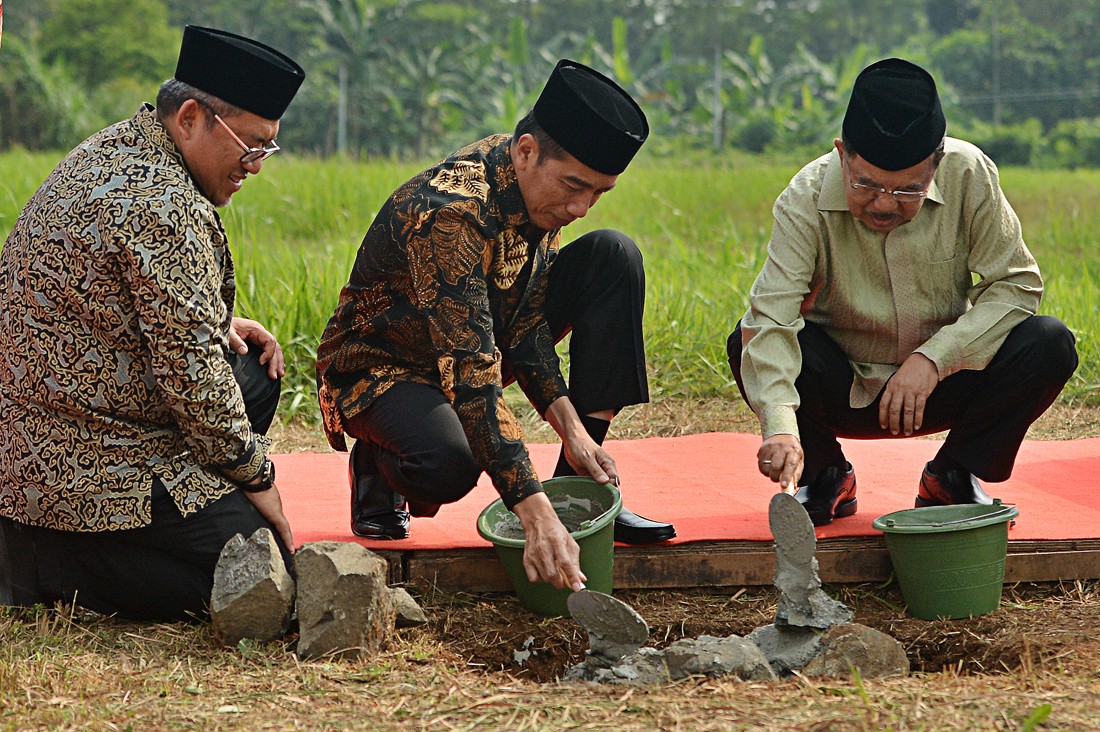New university aspires to present Indonesian Islam to the world
The Jakarta Post’s Marchio Irfan Gorbiano recently spoke to UIII’s rector Komaruddin Hidayat and the dean of UIII’s Faculty of Social Sciences Philips J. Vermonte about the new university and other topics.
Change Size

T
em>The Indonesian Islamic International University (UIII) began its first academic year early last week, three years after President Joko "Jokowi" Widodo inaugurated the construction of its sprawling campus in Depok, West Java, in 2018. Part of President Jokowi’s administration’s national strategic projects, the university is aimed at promoting Indonesia's version of Islam. For the first year, the university took in 98 students from 59 countries, who are all on scholarships.
UIII has also enlisted top Muslim scholars in a series of lectures, who are expected to bring the latest debates about Islam and global politics to Indonesia’s academic scene, including The Australian National University’s Centre for Arab and Islamic Studies deputy director James Piscatori and Warwick University’s Dr. Abdullah Sahin.
The Jakarta Post’s Marchio Irfan Gorbiano recently spoke with UIII’s rector Komaruddin Hidayat and the dean of the university's Faculty of Social Sciences, Philips J. Vermonte about the journey ahead.
Question: What are UIII’s long-term goals? What kinds of outputs are UIII aiming to produce?
Answer
Komaruddin: The question is, why was the university established and to what end? There are at least four reasons.
First, in the context of international diplomacy, Indonesia always gets appreciation from the world as the largest Muslim country, one which exemplifies values of diversity and peace, compared to other countries where the image of Islam is associated with radicalism, terrorism and so on. While in Indonesia, although there are cases of radicalism and terrorism, it reportedly comes from transnational influences.
Although Muslims in Indonesia are the majority [group], they are not insistent on establishing an Islamic state and are even supportive of Pancasila [the state ideology], which is inclusive of all religions. This is why Indonesia needs to have a university that can articulate, contribute and explain the role of moderate Islam.
Second, Indonesian students often receive scholarships to study abroad in Middle Eastern countries such as Egypt, Morocco, Tunisia, Sudan and Pakistan -- and this has been going on for a while. Meanwhile, when they asked about scholarships to study in Indonesia, there were no such schemes. So, this is a matter of national pride as well.
In addition, Indonesia has a long history in politics, its economy, education and culture. In short, Indonesia is often a research object for foreign-based scientists and local scientists who go abroad. We want to flip the situation so that foreigners and professors come to Indonesia. Let’s present and articulate Indonesia to the world through academia.
To achieve these goals, President Jokowi signed the regulations [to establish UIII]. Why do we only offer master’s and doctoral programs? Because we want to prioritize research, although in the long run we could offer undergraduate programs too.
In terms of the institution, if Egypt has Al Azhar, the United Kingdom has the University of Oxford, Indonesia has UIII. That is how, in terms of institutions, UIII could be counted as one of the world class universities. In addition, we want to offer Indonesia in Southeast Asia as a research object to the world.
You mentioned about the challenges of radicalism in Middle Eastern countries, a problem of which Indonesia also shares. How can educational institutions play a role in countering such threats?
Komaruddin: Radicalism in the Middle East is different compared with Indonesia. In Indonesia, the state was born from the people. In the Middle East, the states were freed from the Ottoman Empire and then controlled by [colonial countries], which is why they don’t have a tradition of civil society movements.
Philips: One of UIII’s focus of study is political science, comprising different programs such as comparative politics, international relations and Indonesian politics.
We hope that from such courses, we can discuss the answers to your questions from a multicultural perspective, because the students come from different places where there are conflicts, radicalism or even moderate Islam as well.
Secondly, from international relations. For example, it may be a good example in Southeast Asia in terms of it holding a fully functional regional organization, ASEAN. But maybe the regional organization in South Asia is not as huge as ASEAN, or in Africa, where they also have the African Union.
Through these programs, we want to showcase the Indonesian experience in Southeast Asia, characterized by moderate Muslims, democratic electoral politics and being in the centre of a fully functional regional organization.
We may have something that we can offer to these [foreign] students. They could go on to be leaders, journalists or activists. On the other side, the Indonesian students will also learn about other experiences that could be better or worse compared to our own.
Indonesia has long promoted the moderate image of Islam. What are the challenges for Indonesia in playing such a role on the world stage today?
Philips: As a Muslim-majority country, characterized by moderate [Islam], Indonesia is also embarking on the path of democratization. And this has been admired by the West. But we seldom expose this to other countries. We have not appreciated this and have not cultivated it into something that we could offer to other Islamic countries.
Although Indonesia is not a Muslim country, as seen by its constitution, in one way or another, the Muslim-majority population will have an influence on Indonesia’s foreign policy.
So Indonesia, I think, should position itself in the context of the global community. But on the other side, there are certain identities that characterizes us.









